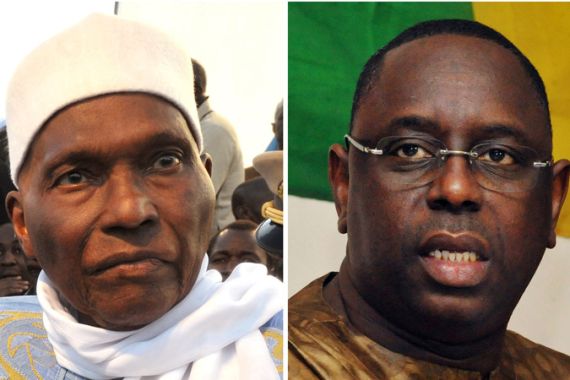Runoff likely as Senegal counts votes
Unofficial results point to possible runoff between incumbent Abdoulaye Wade and main rival Macky Sall.

Senegal’s presidential vote appears set for a runoff, with results indicating that Abdoulaye Wade, the incumbent president, has failed to win an outright majority.
Tallies reported since voting finished on Sunday night show Wade leading and Macky Sall, a former prime minister, close behind, suggesting the two will face each other in a second round, expected to take place between March 18 and April 1.
Sall, who directed an earlier re-election campaign for Wade, said on Monday that he had won Dakar, the capital, and several major towns.
Sall and Idrissa Seck, the mayor of Thies, are the main opposition challengers seeking to unseat Wade.
Wade, 85, was seen as the favourite to win in the first round, with the opposition split between 13 candidates. His chances would diminish in a runoff, as most of the opposition would probably rally around a single challenger.
Wade is seeking a third term amid criticism from the opposition that he is trying to cling to power after changing the constitution, and had earlier claimed that he would win “a crushing majority”.
‘Everything is possible’
Speaking in Dakar on Monday, Wade said a first round win was still possible, with half the votes tallied, giving him 32.17 per cent and handing 25.24 per cent to Sall, but also acknowledged that he may have to face a runoff.
“To all of my supporters, my allies, my sympathisers, I ask that you remain mobilised because at this very hour, the trend from votes counted in 282 out of 551 districts – or half the vote – give me the lead… ,” Wade said. “So everything is still possible – victory, or a runoff.”
Al Jazeera’s Andrew Simmons, reporting from Dakar, said preliminary results clearly indicated that the West African country was heading for another round of voting.
“On those figures, it is seen as impossible that it could be anything other than a second round,” our correspondent said.
“[Wade made] the remark ‘anything is still possible,’ indicating that possibly he could still win the first round. But it doesn’t look that way. This looks like game, set and match to the opposition, because in the long run, the voters will all rally around one candidate and that could very well be Macky Sall.
|
Al Jazeera reports from Dakar |
“It is an uncertain situation in Senegal right now, but there is a mood of optimism that Wade is finally going to be beaten at the ballot box, rather than forced to resign by the influence of international diplomacy and the opposition of Senegal.”
Dakar was noticeably quiet on Monday, and residents said people may have stayed at home to avoid any election-related street violence.
There was a lot of anticipation in the air, but people seemed to be adopting a wait-and-see approach to how all sides would ultimately respond to the final election results, Al Jazeera’s Azad Essa reported from Dakar.
Hundreds of voters booed Wade on Sunday as he cast his ballot in the suburb of Point E in Dakar, drowning out the several dozen supporters who applauded his arrival at the polling station.
Voting passed largely without incident, nevertheless, and counting continued across Senegal with some votes counted by candlelight or lamps.
Partial results were being announced over public and private radio stations.
Residents of Dakar spent much of the night listening intently to the radio stations as results of individual polling stations were released, Al Jazeera’s Essa said.
Senegal, a former French colony, is one of the continent’s pioneer democracies, boasting an unbroken series of elections since independence in 1960.
‘Grand projects’
Wade’s third-term bid has proved to be a test of Senegal’s democratic credentials, prompting international concern and weeks of protests.
Despite having served two terms in office, a limit he himself introduced, Wade says 2008 constitutional changes extending term lengths to seven years allow him to serve two more mandates.
He says he needs more time in office to finish his “grand projects”, but critics say he has failed many Senegalese who continue to live in poverty.
Sunday’s voting took place after Olusegun Obasanjo, the African Union envoy, suggested that Wade retire in two years if re-elected.
The June 23 Movement, an alliance of opposition parties and activists, had called for a presidential election to be organised within six to nine months, one in which Wade does not take part.
Wade was in the opposition for 25 years before unseating the Socialist Party in 2000, and has remained defiant in the face of the storm of criticism at home and abroad.
He has dismissed the opposition protests as “temper tantrums” and heaped derision on calls from France and the US that he should retire.
He would not be dictated to by “Toubabs”, he said, using the Wolof term for Westerners.
Those who support Wade point to considerable infrastructure development under his governance. His opponents argue that his focus on grand legacy projects has left him out of touch with the concerns of the average citizen.
Follow Azad Essa on Twitter at @azadessa